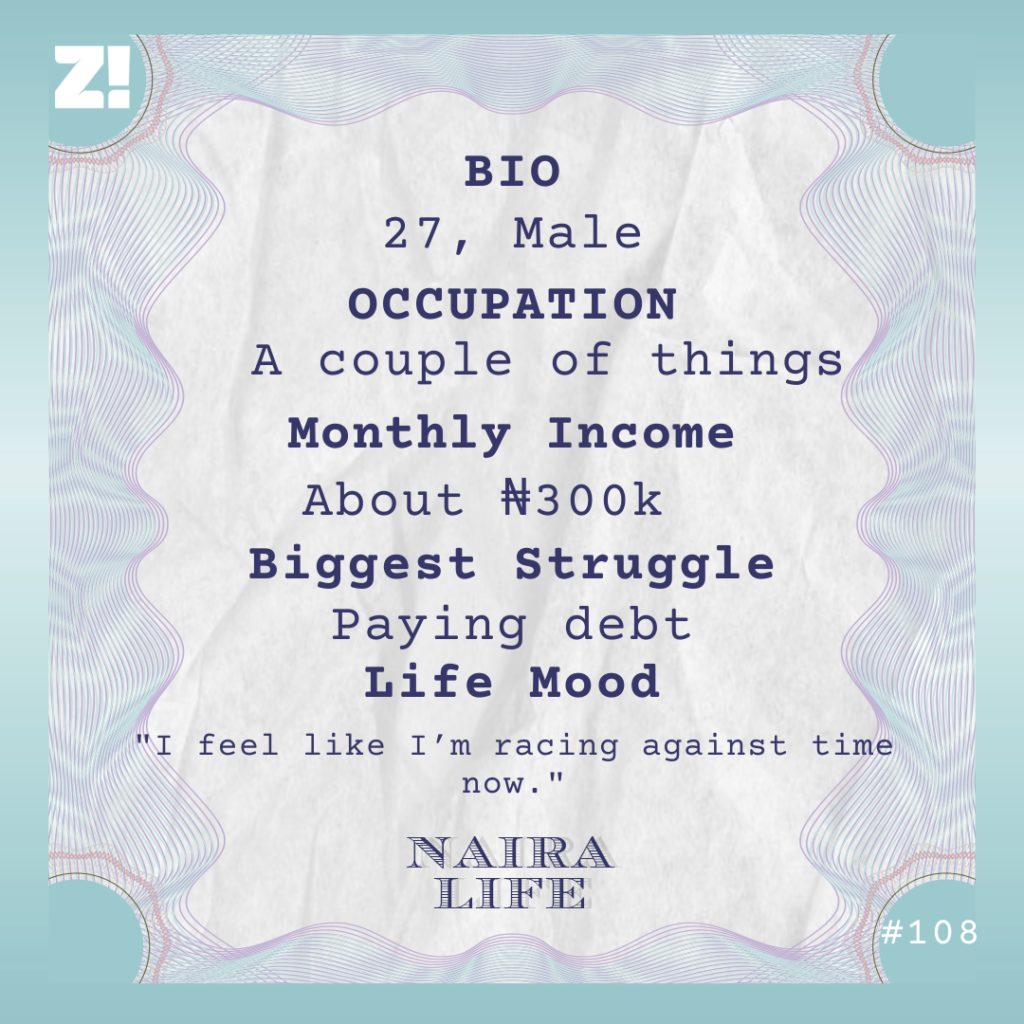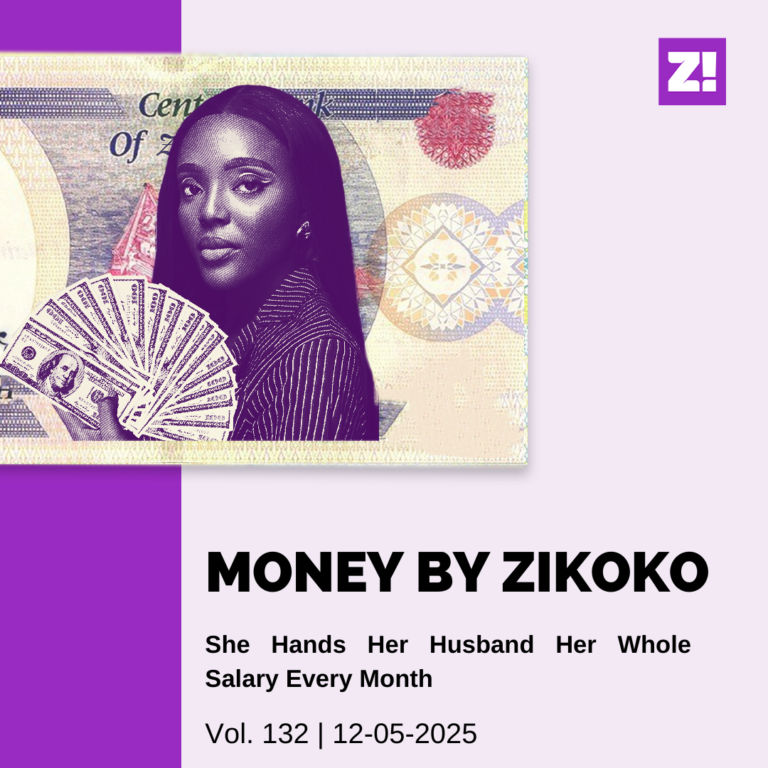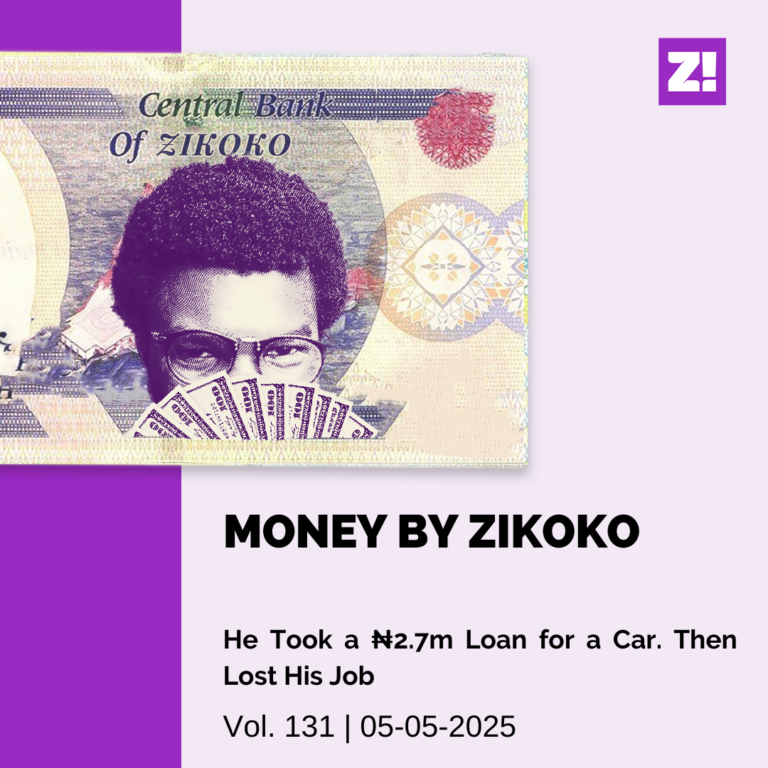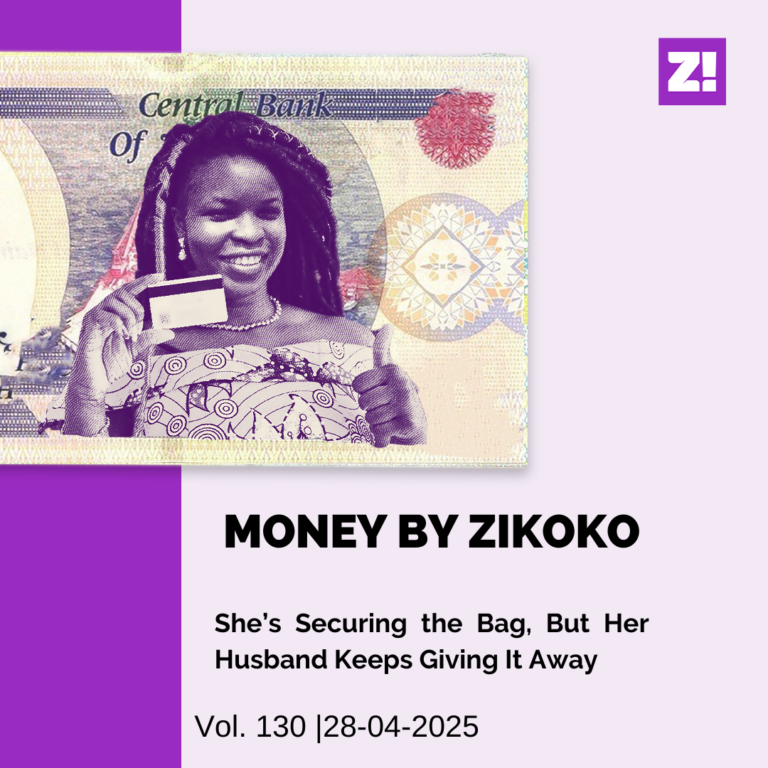Every week, Zikoko seeks to understand how people move the Naira in and out of their lives. Some stories will be struggle-ish, others will be bougie. All the time, it’ll be revealing.
The subject of this story works with small businesses. But before this, he tried to build two businesses from the ground up. The first one landed him in debt. The second one ended with some more dire consequences: legal troubles and debt.

What’s your oldest memory of money?
When I was about to finish secondary school, my dad was laid off at his investment banking job. My mum was also a banker, but she had been laid off years earlier and had moved on to other things.
Do you remember how this changed things?
The driver was the first to go when my dad lost his job. My dad started saying things like, “Let’s find a bike to take you to school.” Then it became hard to afford rent. My parents were building a house already, and we moved in although a lot of work hadn’t been done. We slept on the floor for a while.
My dad never found another job, so it was all on my mum. And she managed it well because the lack wasn’t evident from the outside.
What was the first thing you ever did for money?
ASUU went on strike when I was in 100 level in 2009, and I returned home. Unfortunately, it was one of those long ones. After spending a couple months at home, I grew restless and wanted to do something. The house help had left, and my mum was looking to fill the position. I told her I’d do it, but we had to sign an agreement. I didn’t think she would take me seriously, but she asked me to draw up the terms. She was impressed with my proposition and agreed to pay me ₦10k every month for my work.
LMAO. You got paid for what most of us did for free?
Yup. After two months of doing this, they called off the strike. When I was returning to school, she added ₦20k to my ₦10k allowance and told me that was my salary for the months I worked for her. I was like, “Oh, I can make money from anything?”
In school, a final year student who was a friend needed money for his project. I decided to loan him ₦15k for a month at a 10% interest rate. I pitched it to him, and he agreed. He returned the money plus interest at the end of the month. I felt if I could do it for one person, I might as well do it for 10 people.
Another friend wanted to buy a phone. I loaned him ₦15k and jacked the interest to 15%. He also returned it on time. I decided to go all in. I turned my room into an office and started telling people that I operate a short-term loan business. Students always needed money, so the word started spreading.
Mad oh.
There was a challenge though.
What was that?
Answering the risk question. The chance of students defaulting on loans was very high. But I made everyone who wanted a loan submit the original copy of their school receipt, and I held on to it until they returned my money. My client base started to grow. Now I needed to figure out how to get more capital, so I started putting my monthly ₦10k allowance into the business. Omo, I drank garri ehn.
Haha. But it picked up?
Yes, more than I expected. My model was referral based, and I only dealt with people who were recommended by someone I knew and still had at least one year to spend in school. By 300 level, I’d built some structure and started paying myself ₦5k as salary every month.
Haha.
But I also knew it wouldn’t be sustainable in the long run, especially since I was running everything with my personal resources. I split the business into two and started funding students who had small businesses. I gave them working capital, and at the end of an agreed period of time, we split the profits.
How did it work out?
Great! Before the end of my third year, I had disbursed over ₦100k to people and small businesses. Because I was running two businesses, I brought in someone as my partner to monitor the small businesses and ensure that I got all my money back.
People were noticing what I was doing, and my clout shot through the roof. The rich kids on campus started hitting me up and going, “I have this ₦200k I’m not using. What can you do with it?” I started investing money for people and giving them their capital and returns at the end of the semester. I did that until I left uni in 2013.
NYSC?
Yes. One of my roommates from uni reached out to me and told me he knew a guy making good returns from palm oil. He shipped kegs of palm oil from the south-south where it was cheaper and sold at a higher price in the south-west. The numbers made sense, so I convinced my partner to let us give it a try. I told a few other people I knew from school and raised about ₦500k. The plan was that the guy would give us 5% of the capital every month.
And…
He turned in the first and second month payment. I think ₦35k each. At the end of the third month, my partner called me and went, “We’ve not heard from this guy.” I called his number but couldn’t reach him. I’ve not seen him since that time, and it’s been more than six years now.
Whoa!
I couldn’t bring myself to tell the people that invested that I’d lost their money, so I was paying them as though the business was profitable. I took more money from people and paid those that had invested earlier with it. I hoped to get a hold of the guy and get the money back before anyone noticed. I was in about ₦700k debt before I realised that it wasn’t sustainable and came clean to the investors. I had to figure out a way to pay them.
How did that go?
It was crazy. I started a food items delivery business for corps members in the town I was serving to pay the debt. I raised money from people who trusted me — it was more than ₦100k. I’d buy crayfish and periwinkle, which were cheap where I was, and ship. Corps members always wanted to buy food items and send them home because they were cheaper there.
I also had links to restaurants and food services providers and supplied these food times to them. I built and monetised the entire logistics value chain. This brought in at least ₦50k monthly. By the time I finished my service year, I’d cleared my debts and had ₦300k in savings.
That’s awesome.
I returned home and the question was, “What do I want to do next?” I wanted to do an MBA, but my mum said no. I couldn’t afford to pay for an MBA myself, so I decided to take JAMB and go for a degree in Economics. I was in the middle of the application process when an uncle called and convinced me to do my master’s degree in a science-related course to appease my parents. Then I could go for my MBA after. I thought it was a fair deal, and I took it. This was 2016.
What happened after?
It was quiet at first. But I was already hooked on doing stuff with money, so I was restless about taking a break. I sold small gadgets for a while, but that didn’t bring a lot of money.
Towards the end of my programme, a friend I knew from uni reached out to me. He wanted to start a fintech company and operate in the payment space. I thought I could use my experience in uni and during my service year to do something new. I signed on and dropped out of school to do this with him, even though I was in the middle of my final exams.
Omo
Yup! My plan was to return to school later and finish it.
We started as a micro-lending platform for market women. His dad had a relationship with microfinance banks, and we leveraged that. We gave the women small loans for their businesses. He dropped most of the money — mine was mostly working capital, about ₦40k.
Interesting.
Then he heard that forex trading was the hot thing. He was like, “How about we build a platform and get people to trade for us?” We would get people to give us money to invest and the traders would put the money into the market. We pivoted into it and got some people to invest, and it picked up from there. It was fine for a while, but we started losing money.
When did this start?
I actually don’t know. I was handling operations and comms. My ex-partner was supervising the trading room. I was supposed to know what was happening there, so I could figure out how to manage investor’s expectations and all, but I didn’t. My partner always told me everything was fine, even when it was not.
When did you find out?
We were close to one of the payouts, so I doubled down on asking for updates on when the funds would be available. That was when he eventually came clean and admitted that we were dealing with a significant draw down and had lost all of the money people had with us.
How much?
It depends on who you ask. I have no idea of the exact amount. He was in charge of getting money from investors. And when everything happened, they said it’d run into a couple millions of naira.
Oof.
My ex-partner went into hiding. He wasn’t picking up calls or responding to messages. I thought that since I was the company’s comms guy, I could pacify the investors. Haha. I got arrested. It was a case of if you can’t find a way to give him to us on a platter, we’ll come for you.
Ah.
I was the fall guy. I spent nights in the police jail. The question I kept hearing over and over was, “Where did you keep the money?”
It was a harrowing experience, especially for my mum. By the time law enforcement looked at our trade records, finished their investigations and found that we weren’t trying to rob people and actually incurred losses, she had spent so much money in legal fees trying to get me out, and the family was in debt.
Do you know how much she spent?
For my bail alone, the family raised close to ₦500k. The ensuing drama cost her at least ₦5M. She took loans with crazy interests to raise the money. The money went to paying my legal fees, law enforcement and some of the aggrieved creditors.
I’m curious, where was your ex-partner in all of this?
His family had clout, so they shielded him. He even tried to travel out of the country.
Gosh, I’m sorry.
Things began to calm down in 2019, but I still had to keep showing up at the police station to continue the cycle of interrogations. I was at the lowest point of my life in 2019. I had nothing. I’d started two businesses I thought I could build to something, and both put me in trouble and debt. I couldn’t even go back to school. The shame wouldn’t let me.
I started the year with literally nothing. Later that year, I got a job at a non-profit where I worked on content and business advisory. They paid me ₦20k, and I stayed with them for two months.
Why did you leave?
A mentor contacted me. He was organising a training programme for government officials close to retirement and needed someone to do a workshop on how to avoid investment pitfalls and manage their funds. He thought I had quite the story to share. I was paid ₦150k for that, but it felt like ₦50M.
Oh man.
I mean, I was struggling to buy a one gig data subscription at the time. That gig was a turnaround for me. I put everything into it.
What happened after?
I got more gigs. A feasibility study here, a business plan there. I was getting ₦150k-₦250k on each job and using everything to help my mum clear the debt she was paying off. Most of the jobs came from my mentor’s network, so he decided to integrate me into his company.
I joined his team, and after some time, I started managing a team myself. I got a monthly stipend from my boss to help with remote work set up, but my main pay came from the projects I could execute in a month, and these were getting me an average of ₦300k monthly.
What does the company do?
Business consulting for SMES. Some of these businesses are understaffed and need fixers like me to help create plans and business documents and help them find ways to source funds.
The projects could be anything: creating a feasibility study or developing a social media campaign. My job function changed according to the projects. I could be Head of HR or Chief of Staff.
I did this for a few months. Then Covid started.
How did it affect you?
You know how some people talk about how their income saw an uptick because of the pandemic? I’m one of those people. There was a huge demand for people with technical skills. Organisations were organising virtual events and needed help setting them up. Companies were looking for people to help their staff adjust to working from home. Things like that.
My team made an average of ₦250k on each project. After taking out 10-15% admin fees for the company and allowance for the team — we were often an average of five on a project. I had at least ₦100k left. We did an average three of these projects every month.
Mad.
I was still paying off my debts, but things were beginning to pick up. Then my dad died in 2020. I couldn’t even grieve him because I couldn’t stop working. I was handling a project in the middle of all the burial arrangements. He died when I just started to turn things around. Also, I can’t shake off the sentiment that my legal issues may have been a factor in his death, and I’ll probably live with that guilt forever.
I’m really sorry for your loss. The last couple of years have been rough, but where are you at now?
I’m still at the company. I have a team of six people who work with me on these projects. At the end of the month, I still make up to ₦300k, even after paying the company and my staff.
Let’s break it down.

When do you think you will finish paying off your debt?
I’m hoping it will all be over next year. First quarter of 2022 in the worst case scenario.
What do you imagine life will be like when this happens?
There will still be bills to pay, but nothing as crippling as this. I’ve learned to be more resourceful than ever and looking out for actual opportunities. It’s why I consult for like seven businesses. The challenge is that I bring people on these projects, so I share profits I could have kept. That said, I’m confident my family will never lack.
With everything that’s happened, how do you feel about investments now?
I’m currently averse to investing in anything even though I know that it’s not wise. I’d rather just save. I’m currently my investment, and that’s why I’m putting money into personal development — training programs and short courses.
If someone comes to me and goes, “There’s an investment opportunity.” I’ve logged out already. There’s some PTSD I have to deal with first before I go down that route again. If that ever comes, I’d stick to real estate investments because they are a relatively safer option.
How would you say all of this has shaped your perspective about money?
First, maybe don’t invest money with people because you know them or trust them. Before I put resources in any project now, I have to know everything about it. Also, I place a high premium on personal development. Whatever money you invest in yourself will hardly go to waste.
Is there anything you want now but can’t afford?
I’d like to put about $10,000 in a dollar-denominated portfolio. But I currently can’t do that because I’m not earning enough. If I don’t have any project coming in, I’m toast. Also, my girlfreind came at a time when I’d lost hope and stuck with me until I snapped back to reality. I’d like to marry her as soon as possible, but I’m not sure I can afford that this year.
Rooting for you. This was heavy, but on a scale of 0-10, how would you rate your financial happiness?
5. I feel like I’m racing against time now. I’ve kind of wasted some time I’m not getting back. And playing catch up is very exhausting. This number I gave myself is even me being nice. But when I clear my debt and settle down to start a family, this number can move to 8.




